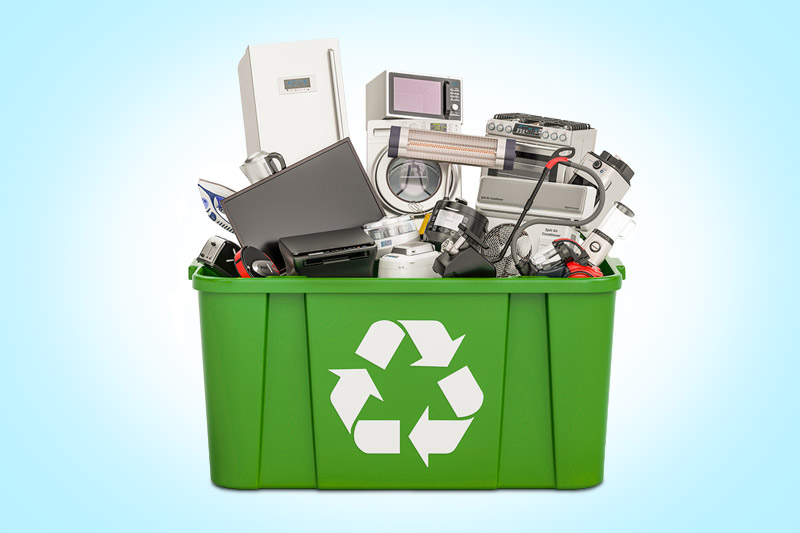Companion with R2 Certification Recyclers: Safeguard Data and Shield the Atmosphere
Companion with R2 Certification Recyclers: Safeguard Data and Shield the Atmosphere
Blog Article
Elevate Your E-Waste Management With R2 Certification: a Comprehensive Review
One trick approach to boost e-waste monitoring techniques is by obtaining R2 accreditation. By discovering the procedures and advantages connected with R2 qualification, a deeper understanding of exactly how it can reinvent e-waste management approaches arises, losing light on a course towards sustainability and ethical disposal techniques.
Significance of E-Waste Management

When e-waste is not taken care of appropriately, these hazardous compounds can seep into the ecological community, triggering injury to wildlife and potentially entering the food chain, posing risks to human health and wellness. The improper disposal of e-waste adds to contamination and greenhouse gas emissions, worsening climate change and environmental destruction.

Advantages of R2 Accreditation

First of all, R2 accreditation boosts credibility by showcasing a company's devotion to sustainable practices. It ensures customers, partners, and stakeholders that the firm follows strict criteria for e-waste administration - r2 certification. This integrity can cause boosted trust and enhanced relationships with customers that focus on environmental responsibility
Secondly, R2 qualification aids mitigate threats connected with incorrect e-waste disposal. By adhering to the rigorous standards stated by the qualification, organizations can decrease the probability of data violations, environmental contamination, and legal effects. This aggressive strategy safeguards the firm's reputation and minimizes possible liabilities.
Last but not least, R2 certification shows a commitment to ecological stewardship - r2 certification. By responsibly taking care of digital waste through licensed processes, organizations add to the preservation of sources, decrease of air pollution, and promotion of a round economic climate. This commitment not just profits the environment but likewise aligns with evolving consumer assumptions for lasting company practices
R2 Qualification Refine Summary
Having developed the benefits of R2 accreditation in advertising trustworthiness, threat reduction, and ecological stewardship, it is important to now detail the comprehensive process associated with getting this accreditation. The R2 qualification process begins with a comprehensive evaluation of the organization's operational policies and treatments to make certain compliance with the R2 standard. This first assessment is important in recognizing any type of gaps that require to be resolved before proceeding even more.
Once the company's practices additional reading straighten with the R2 standard demands, an independent third-party auditor performs an on-site audit to review the implementation and effectiveness of these practices. This audit includes a detailed testimonial of documentation, interviews with team, and physical assessments of centers to validate compliance.
Adhering to a successful audit, the company receives a certification decision based on the auditor's findings. If accepted, the company is our website approved R2 accreditation, showing its dedication to responsible e-waste monitoring. It is crucial to keep in mind that preserving R2 qualification requires continuous compliance with the standard's demands and regular audits to make sure continued adherence to ideal techniques in e-waste recycling and disposal.
Trick Criteria for R2 Compliance
An important element of attaining R2 conformity is making certain that all electronic waste (e-waste) processing centers meet rigid environmental and security standards. To comply with R2 needs, organizations have to stick to vital standards that concentrate on accountable e-waste administration practices. These requirements include carrying out a recorded ecological, health, and safety administration system, making sure the safe handling of data-containing gadgets, and conducting comprehensive downstream due persistance to track the last destination of e-waste materials.
In addition, R2 conformity requires the appropriate screening, refurbishment, and recycling of electronic tools to extend its beneficial life and decrease environmental effect. Facilities looking for R2 certification should additionally prioritize employee health and wellness by offering essential training, personal safety equipment, and a safe workplace. Additionally, preserving comprehensive documents of e-waste handling activities and regularly going through audits by recognized accrediting bodies are essential parts of showing ongoing compliance with R2 criteria.
Influences of Lasting E-Waste Practices
The application of lasting e-waste practices based on R2 compliance not just makes sure ecological and safety criteria are met but additionally significantly impacts the total lifecycle of electronic items. By adhering to R2 link standards, electronic waste monitoring procedures become extra efficient, decreasing the ecological impact of digital items. Sustainable e-waste techniques assist in the appropriate disposal of electronic elements, guaranteeing that dangerous materials are taken care of responsibly and do not wind up polluting the environment.
Furthermore, lasting e-waste techniques can contribute to job development in the recycling and refurbishment industries, fostering economic growth while advertising environmental obligation. Overall, the fostering of lasting e-waste techniques under R2 qualification serves as a critical step towards achieving an extra environmentally sustainable electronic devices market.
Conclusion
Finally, applying appropriate e-waste monitoring practices is important for ecological sustainability and resource preservation. R2 certification plays an essential function in making sure accountable handling and disposal of electronic waste. By sticking to the rigorous requirements established forth by R2 standards, companies can not just minimize their environmental effect however also contribute to an extra sustainable future for generations ahead.
One key method to raise e-waste administration methods is by obtaining R2 qualification. By exploring the processes and benefits linked with R2 qualification, a deeper understanding of how it can revolutionize e-waste monitoring strategies emerges, dropping light on a path towards sustainability and honest disposal methods.
The R2 certification process begins with a complete review of the company's functional policies and procedures to ensure compliance with the R2 requirement. If approved, the organization is granted R2 qualification, demonstrating its commitment to liable e-waste monitoring. Overall, the adoption of sustainable e-waste techniques under R2 qualification serves as a critical step in the direction of accomplishing a much more eco sustainable electronic devices sector.
Report this page